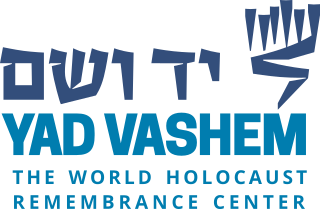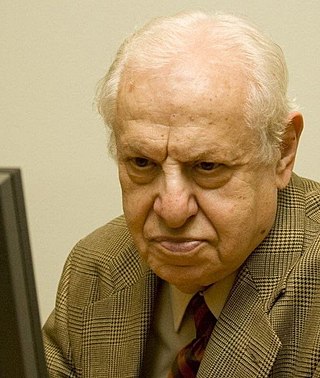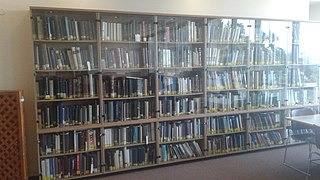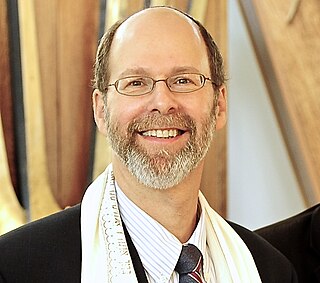Related Research Articles

Sonderkommandos were work units made up of German Nazi death camp prisoners. They were composed of prisoners, usually Jews, who were forced, on threat of their own deaths, to aid with the disposal of gas chamber victims during the Holocaust. The death-camp Sonderkommandos, who were always inmates, were unrelated to the SS-Sonderkommandos, which were ad hoc units formed from members of various SS offices between 1938 and 1945.

Yad Vashem is Israel's official memorial to the victims of the Holocaust. It is dedicated to preserving the memory of the Jews who were murdered; echoing the stories of the survivors; honoring Jews who fought against their Nazi oppressors and gentiles who selflessly aided Jews in need; and researching the phenomenon of the Holocaust in particular and genocide in general, with the aim of avoiding such events in the future. Yad Vashem's vision, as stated on its website, is: "To lead the documentation, research, education and commemoration of the Holocaust, and to convey the chronicles of this singular Jewish and human event to every person in Israel, to the Jewish people, and to every significant and relevant audience worldwide."
This is a selected bibliography and other resources for The Holocaust, including prominent primary sources, historical studies, notable survivor accounts and autobiographies, as well as other documentation and further hypotheses.

Sterling Memorial Library (SML) is the main library building of the Yale University Library system in New Haven, Connecticut, United States. Opened in 1931, the library was designed by James Gamble Rogers as the centerpiece of Yale's Gothic Revival campus. The library's tower has sixteen levels of bookstacks containing over 4 million volumes. Several special collections—including the university's Manuscripts & Archives—are also housed in the building. It connects via tunnel to the underground Bass Library, which holds an additional 150,000 volumes.

The Montreal Holocaust Museum is a museum located in Montreal, Quebec, Canada. It is dedicated to educating people of all ages and backgrounds about the Holocaust, while sensitizing the public to the universal perils of antisemitism, racism, hate and indifference. Through the museum, its commemorative programs and educational initiatives, it aims to promote respect for diversity and the sanctity of human life. The Museum was founded in 1979 as the Montreal Holocaust Memorial Centre and is Canada's first and only recognized Holocaust museum.
Geoffrey H. Hartman was a German-born American literary theorist, sometimes identified with the Yale School of deconstruction, although he cannot be categorised by a single school or method. Hartman spent most of his career in the comparative literature department at Yale University, where he also founded the Fortunoff Video Archive for Holocaust Testimonies.

The International Holocaust Remembrance Day, or the International Day in Memory of the Victims of the Holocaust, is an international memorial day on 27 January that commemorates the victims of the Holocaust, which resulted in the genocide of one third of the Jewish people, along with countless members of other minorities by Nazi Germany between 1933 and 1945, an attempt to implement its "final solution" to the Jewish question. 27 January was chosen to commemorate the date when the Auschwitz concentration camp was liberated by the Red Army in 1945.
Holocaust survivors are people who survived the Holocaust, defined as the persecution and attempted annihilation of the Jews by Nazi Germany and its allies before and during World War II in Europe and North Africa. There is no universally accepted definition of the term, and it has been applied variously to Jews who survived the war in German-occupied Europe or other Axis territories, as well as to those who fled to Allied and neutral countries before or during the war. In some cases, non-Jews who also experienced collective persecution under the Nazi regime are considered Holocaust survivors as well. The definition has evolved over time.
Leon Bass was an educator from Philadelphia. He is noted as an African-American soldier in World War II who witnessed the Buchenwald concentration camp.
The mission of the Bay Area Holocaust Oral History Project (BAHOHP) is to gather oral life histories of Holocaust survivors, liberators, rescuers, and eyewitnesses. The project is developing and maintaining a catalogue database for public use. Their goal is to provide students, scholars, resource centers on the world, and the general public access to their archives.

Randolph Lewis Braham was an American historian and political scientist, born in Romania, Distinguished Professor Emeritus of Political Science at the City College and The Graduate Center of the City University of New York. A specialist in comparative politics and the Holocaust, he was a founding board member of the academic committee of the United States Holocaust Memorial Museum (USHMM), Washington, D.C., and founded The Rosenthal Institute for Holocaust Studies at the Graduate Center in 1979.
The Holocaust Center of Northern California (HCNC) is a non-profit organization formed to ensure that the lessons of the Holocaust never be forgotten. HCNC provides services and programs to fulfill its mission of education, research and remembrance.
The Soap Myth is a play by American playwright Jeff Cohen. It dramatizes the conflict between Holocaust scholars and historians who require documentary proof when determining the history of the Holocaust and survivors of the Holocaust who were eyewitnesses to the horrors and atrocities. The play tackles the larger question of who has the right to determine the truth, who has the right to write history. The play also grapples with antisemitism and Holocaust denial.
USC Shoah Foundation – The Institute for Visual History and Education, formerly Survivors of the Shoah Visual History Foundation, is a nonprofit organization dedicated to making audio-visual interviews with survivors and witnesses of the Holocaust a compelling voice for education and action. It was established by Steven Spielberg in 1994, one year after completing his Academy Award-winning film Schindler's List. In January 2006, the foundation partnered with and relocated to the University of Southern California (USC) and was renamed the USC Shoah Foundation – The Institute for Visual History and Education. In March 2019, the institute opened their new global headquarters on USC's campus.

Vladka Meed was a member of Jewish resistance in Poland who famously smuggled dynamite into the Warsaw Ghetto, and also helped children escape out of the Ghetto.

Yizkor books are memorial books commemorating a Jewish community destroyed during the Holocaust. The books are published by former residents or landsmanshaft societies as remembrances of homes, people and ways of life lost during World War II. Yizkor books usually focus on a town but may include sections on neighboring smaller communities.

The March of the Living Digital Archive Project, begun in 2013, aims to gather Holocaust testimony from Canadian survivors who have participated in the March of the Living. Since 1988, Holocaust survivors have traveled to Poland with young students on the March of the Living to share their Holocaust stories in the locations they transpired.

Eli Rubenstein is a Holocaust educator, writer, filmmaker, and activist. He is currently the religious leader of Congregation Habonim Toronto, a Toronto synagogue founded by Holocaust survivors, served as the Director of Education for March of the Living International since 1988, and currently serves as National Director of March of the Living Canada from 1988 to 2024.

Dori Laub was an Israeli-American psychiatrist and psychoanalyst, a clinical professor in Yale University’s Department of Psychiatry, an expert in the area of testimony methodology, and a trauma researcher. A Holocaust survivor himself, Laub co-founded the Holocaust Survivors Film Project with Laurel Vlock.
Glenn Davis Dynner is an American author and historian specializing in religion and history of East European Jewry. He is the Co-Editor-in-Chief of Shofar: An Interdisciplinary Journal of Jewish Studies and a Professor and Chair of Religion at Sarah Lawrence College.
References
- ↑ "Homepage". Fortunoff Video Archive for Holocaust Testimonies. Retrieved 10 December 2011.
- 1 2 3 4 5 6 Rudof, Joanne Weiner (October 2007). "A Yale University and New Haven Community Project: From Local to Global" (PDF). Fortunoff Video Archive for Holocaust Testimonies. Retrieved 10 December 2011.
- ↑ "1979–1980 New York Area Awards" (PDF). New York Emmy Awards. Archived from the original (PDF) on 7 May 2012. Retrieved 8 December 2011.
- ↑ James Endrst (1 May 2000). "An Unforgettable Holocaust Remembrance". Hartford Courant. Retrieved 11 December 2011.
- 1 2 Sharon Yin (28 November 2011). "Library digitizes Holocaust testimonies". Yale Daily News. Archived from the original on 9 February 2013. Retrieved 11 December 2011.
